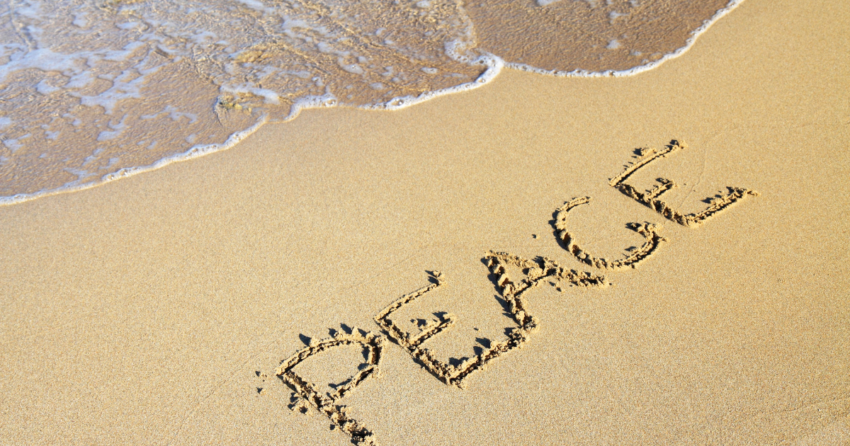Protect Your Peace: Set Boundaries

Let’s be honest, as women, we’re often expected to be everything to everyone. The supermom, the supportive friend, the perfect partner. But what about taking care of ourselves? Setting boundaries is a powerful act of self-love. It’s about recognizing your limits and saying “enough is enough” when you need to. In this post, we’ll explore how to set healthy boundaries in all areas of your life, so you can finally prioritize your own well-being without guilt.

Spa Manager Teigan says setting boundaries is important for good relationships. It helps you feel better about yourself and protects what’s important. Without clear boundaries, you lose focus and can’t do things well.
Want to control your peace? This guide will show you how to set boundaries. You’ll learn to improve your relationships and live a life that fits your values. You’ll find ways to set boundaries with friends, family, and workmates. This will make you feel safer and happier.
Understanding the Importance of Boundaries
Personal boundaries are key for your mental and emotional health. They are like invisible lines that show your limits. They help keep you safe and peaceful.
Defining Personal Boundaries
Personal boundaries are the rules you make for yourself and others. They cover your space, feelings, thoughts, and beliefs. Having clear boundaries lets you say “no” easily and take care of yourself.
The Impact of Boundaries on Mental Health
Healthy boundaries are vital for your mind. A 2019 study linked burnout to mental health issues like depression and anxiety. Setting limits helps lower stress and stops emotional burnout.
How Boundaries Foster Healthy Relationships
Boundaries are the base of good, respectful relationships. They help you balance being alone and together. Studies show that clear boundaries reduce resentment and make relationships better.
“The ability to set healthy boundaries is an essential skill for maintaining our mental health and well-being.”
Remember, setting boundaries is a continuous effort. Check your boundaries often to make sure they work. If you need help, talk to well-being coaches or mental health experts. They can help you set and share your personal boundaries.
Recognizing the Need for Boundaries in Your Life
Knowing when you need boundaries is key for growing and finding peace. You might feel tired, upset, or mad at others. These feelings mean it’s time to protect your peace and think about what you need.
Setting boundaries is a big part of taking care of yourself. It keeps your self-respect up and helps you have good relationships. Studies show that clear, flexible boundaries help families. They let each person grow their own interests and skills.
- Feeling guilty for saying no
- Not speaking up when treated poorly
- Struggling to communicate your needs
- Experiencing burnout or resentment
- Lacking time for self-care
Boundaries decide what’s okay in your life. They save your emotional energy and stop burnout. By setting limits, you make room for being open and sharing experiences. This brings you closer to others over time.
“Boundaries are a part of self-care. They are healthy, normal, and necessary.”
It’s okay to say no without feeling bad, limit social media, and leave places that drain you. These actions help you grow and stay well. Knowing and saying what you need is key to feeling good about yourself.
| Boundary Type | Examples | Benefits |
|---|---|---|
| Physical | Personal space, touch preferences | Safety, comfort |
| Emotional | Sharing feelings, handling criticism | Emotional stability, self-respect |
| Time | Work-life balance, social commitments | Reduced stress, increased productivity |
| Mental | Opinions, beliefs, thoughts | Intellectual growth, self-identity |
The Psychology Behind Boundary Setting
Setting boundaries is a strong way to take care of yourself. It helps keep your emotions safe and builds good relationships. Let’s look at why setting boundaries is important for your happiness.
Overcoming Guilt and Fear of Rejection
Many people feel guilty when they set boundaries. They worry about making others unhappy or being rejected. But, setting boundaries is good for your mind. It’s a way to take care of yourself.
Building Self-Respect Through Boundaries
Setting boundaries shows you respect yourself. When you say what you need, you’re showing you value your feelings. This makes others respect you too.
The Role of Assertiveness in Boundary Setting
Being clear and direct is important when setting boundaries. It means saying what you need without being too hard or too soft. Being assertive helps others understand and respect your limits.
“The only people who get upset about you setting boundaries are the ones who benefited from you having none.” – Unknown
Here are some ways to set boundaries:
- Say “no” without feeling bad
- Use social media less
- Tell others what you need
- Make time for yourself
- Leave places that make you feel bad
Using these tips can make your relationships better and improve your mood. Remember, setting boundaries is a journey of learning and growing.
Types of Boundaries: Physical, Emotional, and Mental
Knowing about different boundaries is important for keeping your space safe. There are three main types: physical, emotional, and mental. Each helps keep you well and builds good relationships.

Physical boundaries are about your body and space. They cover touch and how close you like to be. It’s key to respect these to feel safe.
Emotional boundaries are about your feelings. They help you keep your feelings separate from others. This is important for your emotional health.
Mental boundaries are about your thoughts and beliefs. They let you share your ideas freely. Healthy mental boundaries help you grow and respect others’ views.
- Say “no” without guilt
- Limit social media exposure
- Communicate your needs clearly
- Prioritize self-care and “me time”
- Leave situations that drain you
Understanding and using these boundaries helps you stay well and build strong relationships. Remember, setting boundaries shows respect for yourself and is vital for your well-being.
Effective Ways to Set Personal Boundaries
Setting personal boundaries is key for healthy relationships and good mental health. It helps keep your peace and makes life more fulfilling.
Identifying Your Limits and Values
First, know yourself. Think about what you value and need. Know what makes you feel stressed or uncomfortable.
Communicating Boundaries Clearly
After knowing your limits, tell others clearly. Say “no” without feeling bad. Your well-being is important.
Enforcing Boundaries Consistently
Being consistent is important. Stick to your decisions and set consequences if needed. This might mean leaving bad situations or limiting social media.
“The only people who get upset about you setting boundaries are the ones who benefited from you having none.” – Unknown
Here’s a table showing how setting boundaries helps:
| Aspect | With Boundaries | Without Boundaries |
|---|---|---|
| Stress Levels | Lower | Higher |
| Emotional Well-being | Improved | Compromised |
| Relationships | Healthier | Strained |
| Self-esteem | Enhanced | Diminished |
| Work-life Balance | Balanced | Imbalanced |
Setting boundaries improves your communication and self-awareness. It’s a process that takes practice and patience.
Strategies for Maintaining Boundaries in Various Relationships
Setting boundaries is key to healthy relationships and personal empowerment. You need different strategies for each relationship in your life. Let’s look at ways to keep your peace and reduce stress in all interactions.

In romantic partnerships, it’s important to talk about what you need and want. Say “no” without feeling guilty if it doesn’t fit your values. Make sure to take time for yourself to keep your identity strong.
With family, set boundaries that are right for the age of your children. Also, decide how much time you want to spend with certain relatives. This can help you feel less stressed and more happy in your family time.
“Setting boundaries early on is essential for effective communication and positive interactions with others,” notes social worker Karen Salerno.
In friendships, it’s key to know what makes you uncomfortable. Stay away from people or places that make you feel bad. Also, limit your time on social media if it hurts your feelings. This helps you feel better and grow as a person.
| Relationship Type | Boundary Strategy | Benefit |
|---|---|---|
| Romantic | Communicate needs clearly | Mutual respect and understanding |
| Family | Set time limits | Reduced frustration and stress |
| Friendships | Identify toxic relationships | Improved emotional well-being |
| Work | Establish work-life balance | Prevent burnout and increase productivity |
Remember, sticking to your boundaries shows others how to treat you right. Start small to build your confidence. By doing this, you’ll have healthier relationships and feel more empowered.
Dealing with Boundary Violations and Toxic Relationships
It’s hard to keep your emotional well-being safe in toxic relationships. The first step is to know who is crossing your boundaries. These people often try to control you, making you feel tired and not valued.
Identifying Boundary Violators
Toxic people can be anyone – family, friends, coworkers, or neighbors. They often have certain traits that are easy to spot:
- They don’t care about your feelings
- They always criticize you
- They make you feel guilty
- They try to control your emotions
Handling Pushback and Manipulation
When someone pushes back, stay strong in your choices. You don’t have to explain or justify your boundaries. In toxic relationships, protecting yourself is more important than making others happy.
“No” is a complete sentence. You don’t owe anyone an explanation for your boundaries.
When to Consider Cutting Ties
At times, the best thing for you is to stay away from toxic people. If someone keeps crossing your boundaries, it might be time to limit or cut contact. This is for your own emotional health.
| Boundary Violation | Possible Action |
|---|---|
| Repeated disrespect | Limit contact |
| Emotional manipulation | Seek support from friends or therapist |
| Physical threat | Cut ties and involve authorities if necessary |
Remember, setting boundaries is about protecting yourself, not punishing others. Keep your peace and don’t be afraid to ask for help when dealing with boundary violations.
Setting Boundaries at Work: Balancing Professional and Personal Life
In today’s fast world, keeping work and life separate is key. Setting boundaries at work helps you manage stress and do better at your job. It makes your work place better and keeps your personal time safe.
First, decide when you work and stick to it. Tell your team and bosses when you’re free. This stops you from getting too tired and helps you do your best work.
It’s okay to say “no” when you can’t do something. Share tasks with others and pick the right time to work. Remember, setting limits is good for you and helps you succeed.
If you work from home, make a special work area. This helps you switch between work and home life. Don’t check work emails when you’re not working. Make time for yourself to stay balanced.



